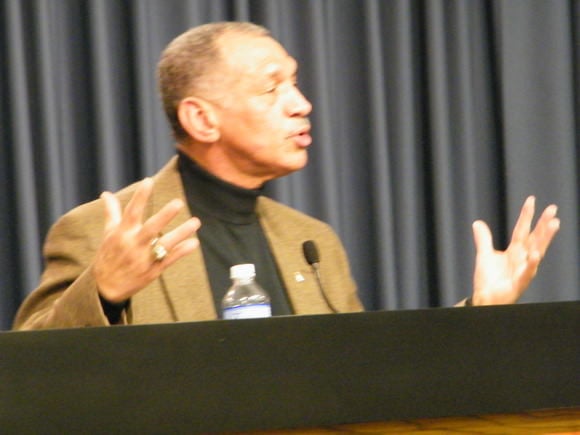[/caption] NASA Administrator Charlie Bolden spoke with reporters Saturday at Kennedy Space Center on the eve of the launch of the STS-130 mission, answering questions that focused mainly on the new 2011 NASA budget and the cancellation of the Constellation program. The big question in many people's minds is, with no Ares rockets, how will NASA do the "bold plans" for exploration and move beyond low Earth orbit? Bolden said that, NASA will build a heavy lift rocket, but likely not until sometime between 2020 and 2030, which is the same time frame – or later – that the Ares V was projected to be ready. Bolden said the biggest difference is that NASA will likely build a big rocket with international partners.
"I haven't talked to anybody that doesn't agree that the nation needs heavy lift capability," said Bolden. "We need it for science, intelligence, for DOD, and NASA needs it for sending humans beyond orbit. How do we evolve there? We take the lessons learned from Constellation. If I'm able to negotiate with Congress appropriately we may actually be carving out some subsystems that are in Constellation because they are advanced technology, and they are things that we will need to develop a heavy lift system. So while we will phase out the Constellation program per se, I don't want to throw out the baby with the bathwater. We want to try to capture technologies and capabilities that are resident in Constellation as we migrate towards a new system."
Asked specifically about a timetable for heavy lift, Bolden said he ideally would like to see a rocket ready to go in the 2020 – 2030 time-frame, but that first NASA needs to decide what the destinations are. He said he thought Mars was the ultimate destination for humans, but that we would need to spend some time on the Moon first.
So, doesn't this sound like Constellation – go to the Moon to prepare for Mars? Bolden admitted the cancellation of Constellation was for budgetary reasons. So, going forward, NASA will work (and split the costs) with other nations – as they are currently doing with the International Space Station -- to explore beyond LEO.
[caption id="attachment_54652" align="alignnone" width="580" caption="NASA Adminstrator Charlie Bolden at Kennedy Space Center, Feb. 6, 2010. Image: Nancy Atkinson"]
[/caption] "The President has instructed me that this is going to be in international effort," Bolden said, "and that we are going expand our involvement with international partners. I'll be meeting with three of my partners tonight before the launch, to talk about where we're going from here. So it's going to be different than the way we used to do it. We're going to put international partners in the critical path, which means they may develop a system that we know how to do, but we don't know how to do it as well."
Bolden admitted he didn't handle the rollout of the new budget and Constellation cancellation very well. "Why wasn't the NASA workforce better prepared for this? I will take the heat, was because I didn't listen to people to how we should roll this out. So we rolled out everything at once, and the workforce was not was not well prepared and I apologize. I was stupid, I admit that, I didn't do it right."
Bolden talked about the "game changing" technology of ion engines and using commercial companies as crew and cargo carriers to the ISS.
"Constellation was putting all our eggs in one basket," he said. "Commercial allows us a redundant capability," along with the ability to buy seats on the Soyuz rockets.
Bolden disagreed with those who have said the "flexible path sound like you're going nowhere. I don't agree. We will go as we develop the capability."
He also "respectfully" disagrees with US Senator Richard Shelby's (R-AL) opinion that this is the end of human spaceflight for NASA.
"We may get there more rapidly by opening up the venture with international partners," Bolden said.
 Universe Today
Universe Today
